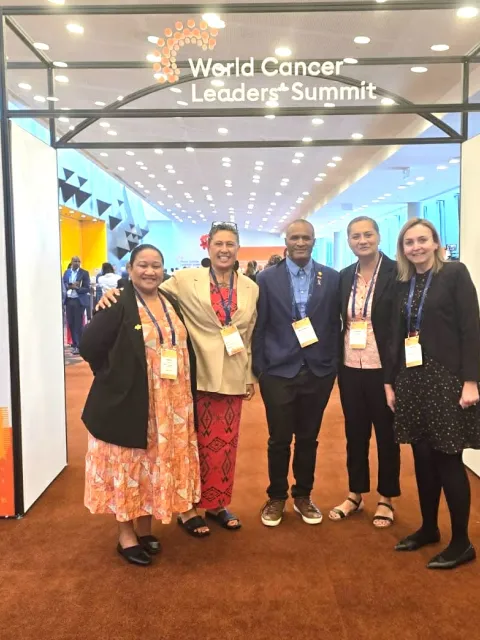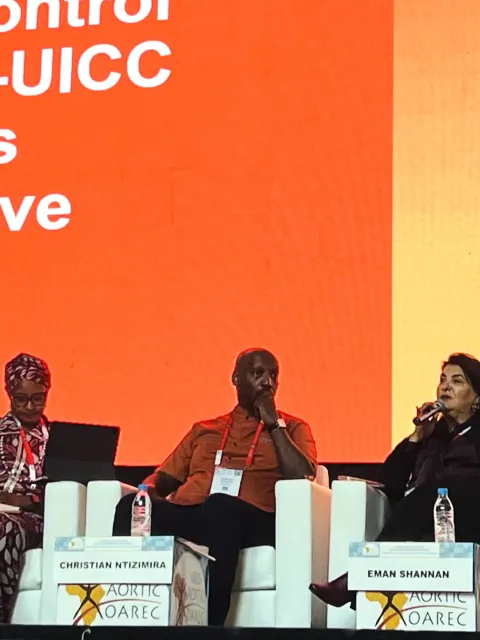Lessons learned from Maputo, Mozambique

UICC Young Leader, Florence Manjuh is a state registered nurse, supervisor of the Women’s Health Programme (WHP) at Cameroon Baptist Convention Health Services. As part of the Young Leaders’ programme, Florence received funding to attend the Extension for Community Health Outcomes (ECHO) Immersion training and the AORTIC conference in Maputo, Mozambique.
As the focal point for ECHO in Cameroon, I was glad to have the opportunity to attend the ECHO training in order to increase my understanding of the ECHO project and discover the opportunities available for nurses. As the training was held two days before the AORTIC conference, I was fortunate enough to be able to attend both events enabling me to benefit from a wide range of learning opportunities and gain access to a huge network of fellow cancer control professionals.
The ECHO movement started as a result of lack of access to high-quality healthcare and shortage of knowledgeable healthcare teams. Cancer patients often have complex needs which are best managed by multidisciplinary teams and unfortunately, many of these specialists are found only in urban areas. Since its launch in 2003, ECHO has grown from one hub focussing on one disease, Hepatitis C, to 162 hubs in 70 countries covering over 70 different diseases.
It was a great learning experience especially as I have used the knowledge shared by the University of Texas MD Anderson Cancer Center, the only oncology-focused ECHO Superhub, to improve my work as supervisor of the WHP’s cervical cancer screening programme, and shared my learnings with other local actors. The training further motivated me to collaborate with other organisations and strive towards increasing quality screening services in my country.
Following the ECHO Immersion training, I participated in the African Organization for Research and Training in Cancer (AORTIC) 12th International Conference on Cancer in Africa from 5 to 8 November 2019 in Maputo, Mozambique. This conference hosted over 1000 members of the cancer community from around the globe. This was done under the theme “Cancer in Africa: Innovation, Strategies, Implementation” and it benefited from a program developed by an internationally representative Scientific Program Committee.
During the four days at Maputo, I observed a distinctive focus on cancer in Africa, oral presentations, technical, and posters sessions, a variety of formal and informal opportunities to network with peers and colleagues from more than 55 countries. Equally, there were learning and collaboration opportunities through meeting sessions and exhibits from companies and organisations highlighting the newest products and services available for cancer care and control.
“To triumph over cancer in Africa, it is for great minds to share their knowledge. The biennial AORTIC Conference was a perfect platform for great minds to share, learn, and collaborate.”
Through the lessons learned from the ECHO immersion training and the AORTIC conference, I have been able to achieve a great deal. Connections I made with CHAI and Roche have led to continued discussions on how we can collaborate on providing HPV vaccinations and fighting cancer in Cameroon. My organisation’s health facilities have been recognised by the national cancer control committee and as a result, it has been selected as a training centre for cervical cancer prevention. In addition to this, we worked with the permanent secretary for the fight against cancer to publish a magazine on female cancers to provide information and raise awareness among the population. All of these activities since my visit to Maputo is a step forward in achieving my goal of improving cervical cancer control in my country. I greatly appreciate UICC’s Young Leaders Program for supporting me and for the benefits this has led to both for myself and for the Cameroon Baptist Convention Health Services.
(Photo UICC Young Leader, Florence Manjuh attending AORTIC in Maputo, Mozambique)
Last update
Monday 25 August 2025Share this page


